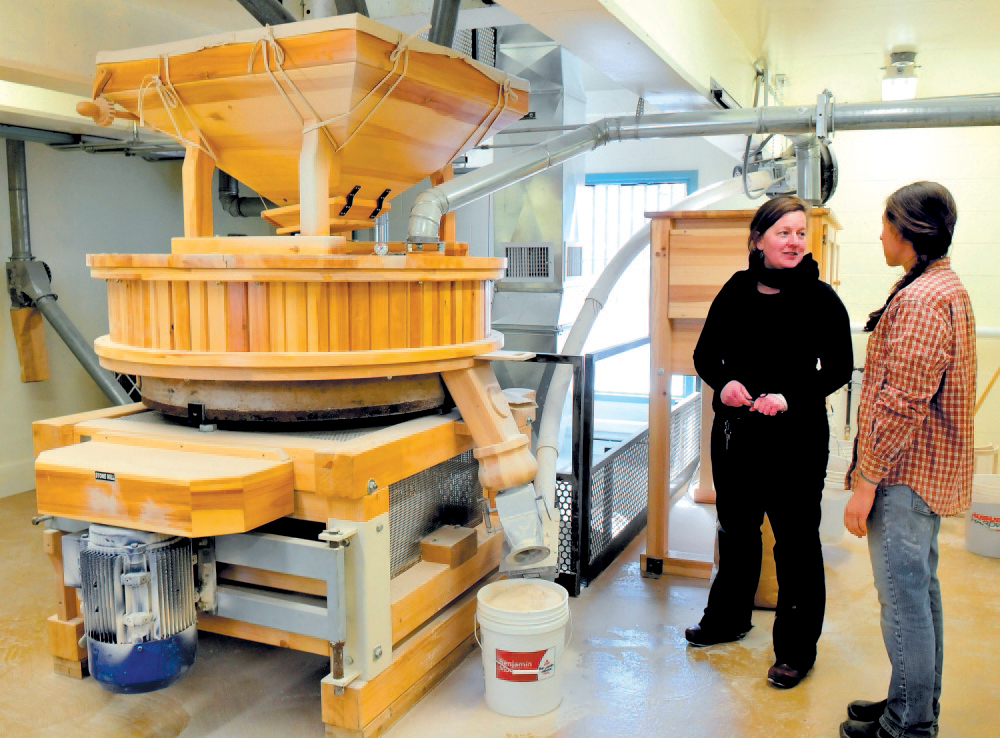SKOWHEGAN — The Somerset Grist Mill plans to install new equipment that could quadruple its oat production, allowing the company to satisfy demand for its high-selling grain.
Maine Grains, the company that owns the mill, has been processing oats since it opened in 2012, but it didn’t expect such high demand for the versatile grain, president Amber Lambke said Thursday. She estimated oats account for about 40 percent of the company’s business amid sales of other grain products such as rye, wheat and buckwheat.
“We primarily focused on flour for bread makers,” she said. “Oats is an obvious and popular product, just one we hadn’t anticipated.”
With assistance from an $89,000 grant from the U.S. Department of Agriculture, the mill will upgrade the machinery it uses to de-hull raw oats and fill the demand it has from customers all the way from Maine to New York City.
When it started three years ago, Maine Grains bought a used de-hulling machine that had been used previously to produce pig feed, Lambke said. The machine worked fine, but it is slow and inefficient. The company is considering a new de-hulling machine from Germany that is much faster and can separate whole oats and chaff from the grain.
Maine Grains obtains most of its oats from farmers in Aroostook County, where oats are used as a rotation crop with potatoes and legumes, Lambke said. The geography in central Maine means if farmers grow oats at all, they probably grow them in smaller amounts for livestock feed, Lambke said. With its current equipment, the mill is able to produce 160 to 200 tons of oats a year. The mill is shooting to quadruple its production with the new machinery, she said.
The company has started talking to the manufacturer and expects to start installing the de-huller later this autumn or in early winter, Lambke said. With the new equipment, the company is set to expand its workforce, adding seven full- or part-time employees, mainly on the marketing and distribution end of the business.
The Kennebec Valley Council of Governments applied for the funding through the USDA’s Rural Development Program. Gail Chase, the community development manager at KVCOG, said the project fit into the agency’s focus on supporting local agriculture as an economic development tool.
“There are a lot of things that were attractive about this project, not the least of which is the incredible knowledge that Amber Lambke has about agriculture in Maine,” Chase said. The new equipment will help Maine Grains expand an existing market instead of trying to create a new one, she said.
The mill produces oats using a dry roll process, which creates a product superior to typical steam-rolled oats, according to Lambke. The mill’s customers include restaurants, bakeries, natural food stores and breweries, as well as academic institutions such as Bowdoin and Colby colleges.
Oats traditionally are used as a hot breakfast cereal and in granola, but the grain’s popularity is surging with the current trend toward gluten-free diets, Lambke said.
Outside human consumption, oats are popular feed for livestock; organic oat straw is used by farmers who must use certified organic bedding for their livestock; and discarded oat hulls can be used as biofuel, construction material, mulch, compost and livestock bedding.
Peter McGuire — 861-9239
Copy the Story LinkSend questions/comments to the editors.




Success. Please wait for the page to reload. If the page does not reload within 5 seconds, please refresh the page.
Enter your email and password to access comments.
Hi, to comment on stories you must . This profile is in addition to your subscription and website login.
Already have a commenting profile? .
Invalid username/password.
Please check your email to confirm and complete your registration.
Only subscribers are eligible to post comments. Please subscribe or login first for digital access. Here’s why.
Use the form below to reset your password. When you've submitted your account email, we will send an email with a reset code.